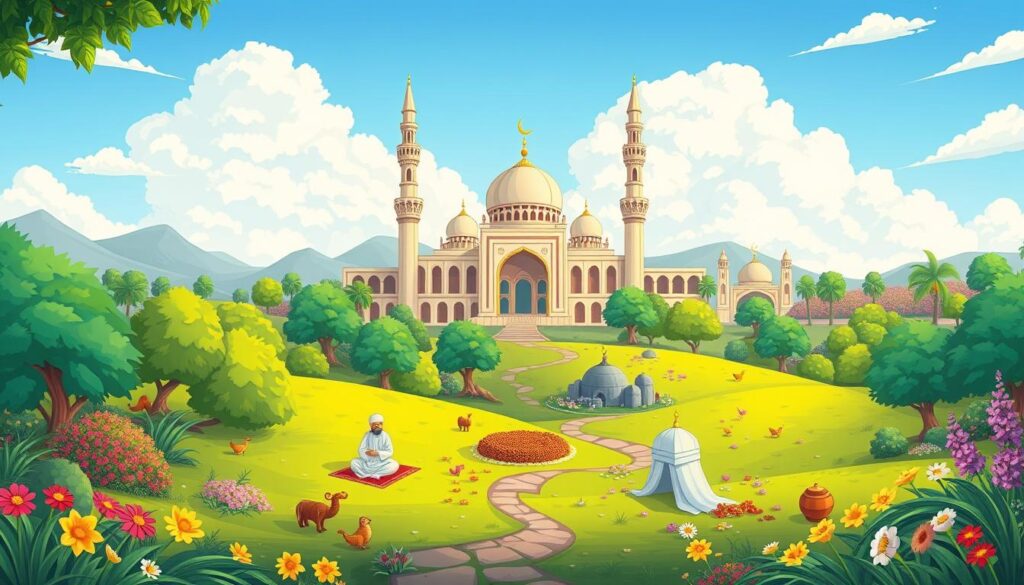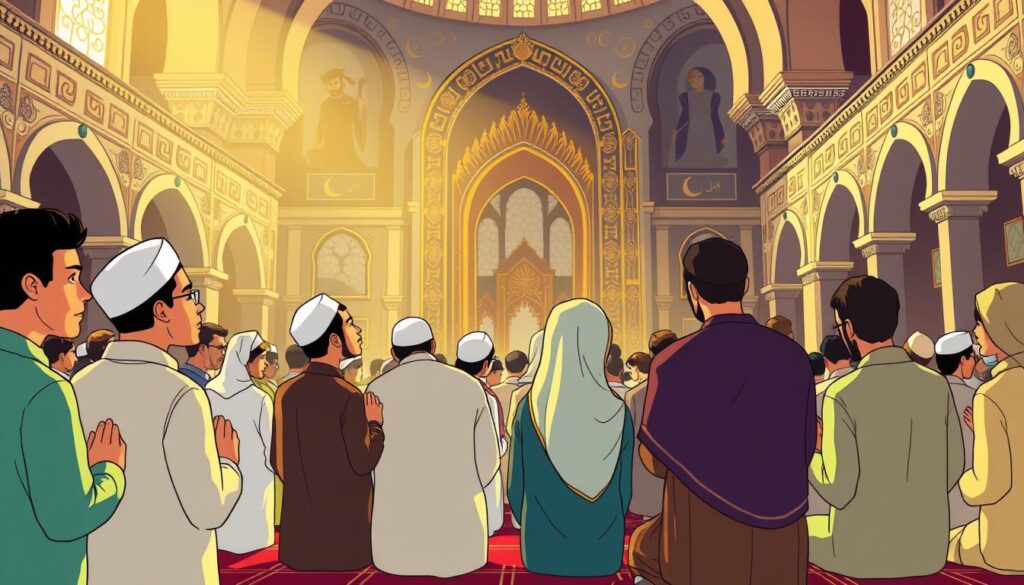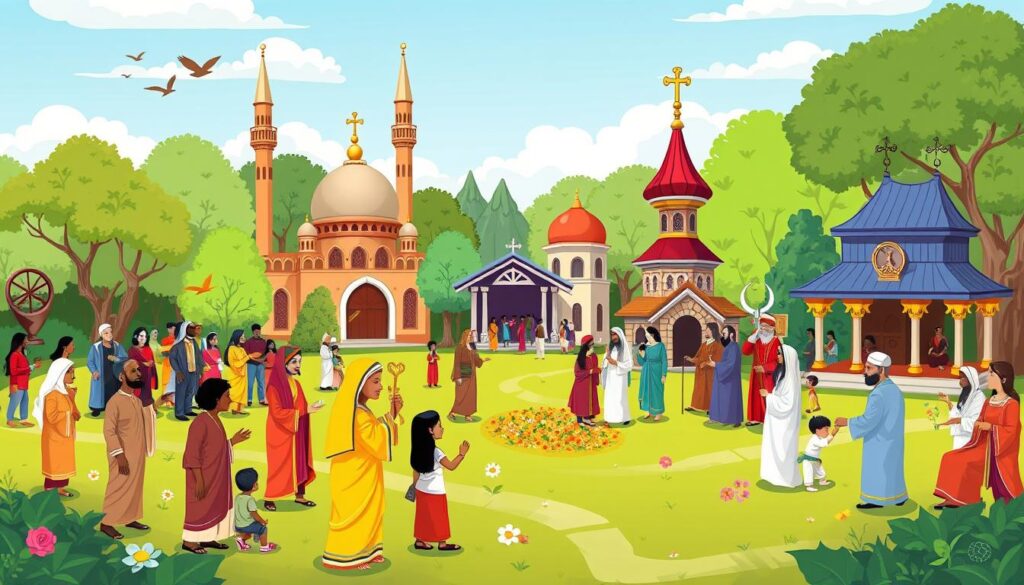The Islamic worldview gives us a deep look into life, the universe, and how we connect with God through faith. It guides us to understand our goals and duties to each other and the planet. With around 1.2 billion followers, our community is diverse. About 75% of Muslims are not Arab. We all follow the Qur’an, completed by 650 AD.
This view encourages us to think about our role in the universe. Understanding our faith helps us make sense of life’s complexities. It motivates us to better our communities with acts of kindness, leading to good changes. Our charity Umar Khan Charity Organization is a great example of this effort.
Key Takeaways
- The Islamic worldview provides insights into existence, spirituality, and morality.
- We strive to understand our responsibilities to each other and the Earth.
- Approximately 1/5th of the world’s population identifies as Muslim.
- The Qur’an is a foundational text that guides our beliefs and actions.
- Community engagement is essential for positive change and empowerment.
1. Introduction to the Islamic Worldview
The Islamic worldview helps us see life, the universe, and the Divine in a special way. It’s built on key ideas that guide not just how we worship, but how we live every day and make moral choices. By understanding this worldview, we learn about important Islamic beliefs. These include knowing God is one and that faith in Islam is central to our lives.
Faith encourages us to build community, show kindness, and strive for justice. This understanding is crucial for Muslims worldwide.
Defining the Islamic Worldview
At the center of the Islamic view is acknowledging God’s oneness. This idea shows us a reality that is always the same and never changes. Our values come from what God has shown us, not just what culture tells us. This gives our lives more purpose and direction.
Islamic teachings show us life has two parts: our life here and the life after. This idea helps guide our choices, leading us to do good deeds.
Importance of Faith in Islam
Faith is key to who we are as Muslims, shaping how we interact and make decisions. It makes us see the value in connecting with others and doing good. Today, there are over 1.8 billion Muslims, and this number is growing. This shows how many are committed to Islamic teachings.
Embracing our faith starts us on a journey of personal growth. We aim to understand ourselves better and live in a way that matches God’s qualities.
| Aspect | Description |
|---|---|
| Al-Tawḥīd | The belief in the oneness of God, establishing a fundamental reality in Islam. |
| Divine Revelation | The source of moral values, directing our ethical actions based on God’s commandments. |
| Moral Education | The significance of instilling ethical values to ensure community harmony. |
| Community Engagement | Active participation in society, reinforcing the importance of charity and justice. |
2. Core Beliefs and Tenets of Islam
The core beliefs of Islam are the foundation of our faith and how we act. The Five Pillars of Islam are key practices every Muslim follows. They strengthen our bond and teach us Islamic values. Each pillar is a guide to living by Islam’s teachings. Now, let’s dive deeper into these beliefs.
The Five Pillars of Islam
The Five Pillars of Islam are basic actions that show a Muslim’s faith commitment:
- Shahadah: Declaring faith in the one God, Allah, and His prophet, Muhammad.
- Salah: Praying five times a day in the direction of the Kaaba in Mecca.
- Zakat: Donating 2.5% of your wealth to help those who need it, building community support.
- Sawm: Fasting in Ramadan to develop self-control and empathy for the poor.
- Hajj: Going on a pilgrimage to Mecca once in your life if you can.
The Concept of Tawhid (Oneness of God)
The belief in Tawhid means seeing Allah as the only God. This idea tells us He deserves our dedication. Tawhid brings Muslims together, avoiding divisions like race or class. By understanding Tawhid, we make our communities more inclusive and responsible.

The Five Pillars and Tawhid teach and shape our understanding of Islamic values. They guide us individually and push us to work together for good causes. This way, we live out our faith’s mission of kindness and support.
3. The Nature of Reality
We explore the nature of reality, looking at both the physical and spiritual worlds through Islamic views. This approach doesn’t just see the world as material things but as a part of God’s will. To understand existence, we must look at angels, jinn, and Islamic cosmology’s bigger picture.
Understanding the Physical and Spiritual Worlds
The Islamic view links the physical and spiritual worlds together. The natural world follows laws that show Allah’s order. By learning about nature, geography, history, and ourselves, we see the value of seeking knowledge.
Islam teaches that everything around us are signs pointing to Allah’s greatness. Allah is seen as everything: the beginning, end, visible, and hidden. This urges us to connect with nature as a reflection of God’s creativity. We’re then inspired to act ethically, in tune with our spiritual beliefs.
The Role of Angels and Jinn
Angels and jinn are key in Islam, connecting the material to the spiritual. Angels follow God’s will strictly, reminding us of our duties to Allah. Jinn, however, have their own will and affect humans. This adds depth to our understanding of right and wrong.
Thinking about these ideas helps us in our efforts to help others. Lessons on kindness, for example, help connect our physical and spiritual lives. This builds a strong community sense and shared duty. For deeper understanding, kindness’s role is key in linking our realities, creating a meaningful communal bond.
4. The Purpose of Life in Islam
In Islam, understanding our purpose involves learning about worship, knowledge, and building a community. We learn from divine messages that Allah created each person. This teaches us our true value and our duty to serve Him. Gaining knowledge is highly valued as it helps us face life’s challenges and meet our community duties.
Seeking Knowledge
Seeking knowledge is both a spiritual and intellectual journey. It reflects the core of Islamic values and guidance from God. By seeking knowledge, we make sure our actions match our good intentions. This not only increases our understanding but helps us make a positive impact in society. Learning helps us follow the path Allah set for us.
The Importance of Community
Community is key to fulfilling our purpose in Islam. It provides support and a sense of shared duty. Working together for good strengthens our connections and encourages us to look after each other. Groups like the Umar Khan Charity Organization show Islamic principles in action. They remind us of our shared duty to help those in need.

| Purpose of Life in Islam | Key Aspects |
|---|---|
| Worship Allah | Central duty of every believer, encompassing all actions when performed with the right intention. |
| Seeking Knowledge | Encouraged as a means of better understanding our faith and responsibilities. |
| Community Support | Fostering relationships and assisting one another in spiritual growth. |
| Collective Responsibility | Working together for the common good and uplifting society. |
| Spiritual Growth | Reflecting on one’s actions and their alignment with Islamic values. |
5. Ethics and Morality in Islam
The Qur’an and Sunnah are key to Islamic ethics, teaching us about right and wrong. Sharia law, based on these teachings, guides Muslims morally. It encourages kindness, justice, and support for those in need, much like the Umar Khan Charity Organization does.
The Role of Sharia Law
Sharia law gives detailed rules for life, faith, and community welfare. It values justice, mercy, and wisdom. Sharia aims to protect:
- Necessities (daruriyat): Key life and religious aspects.
- Needed Things (hajiyat): Things that improve community life.
- Recommended (tahsiniyat): Things that add to societal comfort.
Islam teaches that we’re all accountable for our actions, as the Qur’an says. This teaches us that what matters is not just following rules, but also being good and sincere in our intentions.
Concepts of Right and Wrong
In Islam, understanding right and wrong is complex. The Qur’an talks about promoting good and preventing evil, similar to many religions’ morals. Values like kindness, charity, honesty, and forgiveness are key.
While Islam doesn’t have a set list of moral rules like the Ten Commandments, it still focuses on good behavior and character. The principles found in Surah 17:22-39 guide Muslims, as do teachings about being kind and having good manners.
Scholars say focusing on community, human dignity, and justice is important in Islam. By living these values, we create a better relationship with others and with God. This approach strengthens our moral understanding and fosters peace.
For a deeper look into Islamic ethics, check out this resource.
6. The Relationship Between Humanity and the Divine
In Islam, the relationship between humanity and the Divine is deeply meaningful. It’s built on a strong foundation of servitude to Allah’s will. The bond grows stronger through key practices like prayer, connecting us to the Divine.
The Concept of Servitude
Servitude in Islam means more than just following orders. It’s about fully engaging with our creator, Allah. By accepting Allah as the ultimate authority, we grow spiritually. We not only become better on our own but also help improve our communities.
Importance of Prayer and Worship
Prayer, or Salah, is crucial in Islam. The importance of prayer cannot be understated. It’s a time to reflect, ask for forgiveness, and be thankful. Praying regularly helps us stay close to the Divine and live by values of kindness and mercy towards others.

These acts of worship help us realize our true purpose and our duties. We’re reminded of our responsibility to Allah and to help each other, especially in tough times.
7. Life After Death in the Islamic Worldview
Islamic beliefs about the afterlife show a deep understanding of what comes after our time on earth. At the heart of this belief is the Day of Judgment. This is a crucial time when each person is judged for their actions in life.
The Day of Judgment
The Day of Judgment brings to light the outcomes of our choices. Islam teaches that life after death is real, as stated in the Qur’an. It tells us that we will see the results of our good and bad deeds. “Whoever does an atom’s weight of good will see it, and whoever does an atom’s weight of evil will see it.” This quote shows how our actions are weighed. This decides if we spend eternity in happiness or not.
Concepts of Heaven and Hell
Heaven (Jannah) and Hell (Jahannam) are where we end up, depending on how we lived. Those who have done well will enter Jannah, a place of joy and peace. Those who have not will face Jahannam. Here, souls suffer for their wrongdoings.
The period called Barzakh happens after death. It is an in-between time that shows what the afterlife might be like. This belief motivates Muslims to live good lives, thinking of the afterlife.
8. The Role of Religion in Society
Religion does more than shape beliefs; it forms cultures, influences morals, and creates community bonds. The Islamic culture deeply impacts art, architecture, literature, and social ethics. These aspects showcase the Islamic way of life, guiding millions in their daily lives. With over 1.5 billion Muslims worldwide, it’s key to understand this impact to appreciate their common identity.
Islam’s Influence on Culture and Civilization
Islam has deeply affected the growth of civilizations across history. It brings out a unique cultural identity focused on compassion, justice, and community. Through shared values and ethics, Islam lays the groundwork for good behavior and social norms.
- Art and Architecture: Islamic art highlights spiritual beliefs through geometry and calligraphy.
- Language and Literature: Arabic has enriched many languages, showing the depth of Islamic literature.
- Social Ethics: Islamic teachings influence laws and social actions, improving community relations and respect.
Interfaith Relationships and Dialogue
In our quest for harmony, interfaith dialogue is crucial for understanding between religions. This conversation builds respect for different beliefs and traditions. It also shows us the shared values that connect us across various faiths. Many groups work to build interfaith connections, overcoming divisions, and collaborating on humanitarian projects.
- Promoting mutual respect through dialogue initiatives.
- Building bridges between communities with shared goals.
- Encouraging participation in collective social projects.

9. Conclusion: Embracing the Islamic Worldview
Embracing the Islamic worldview is a journey of faith. It helps us connect deeply with our beliefs and each other. The core of this worldview is Tawhíd, Khilāfah, and ‘Adālah. These guide us in our duties to each other and the Divine.
Walking this path shows us the power of unity and compassion. These are key in connecting various communities.
The Ongoing Journey of Faith
Reflecting on our faith journey shows us how we can change the world positively. Islam teaches us to understand and respect others. This builds relationships based on respect and compassion, recognizing our shared humanity.
By living these values, we help bring about positive change. This benefits both people and society.
Moving Forward with Understanding and Respect
Groups like Umar Khan Charity Organization show us the importance of helping those in need. They remind us to stay true to our faith. We aim to create peace and harmony, fulfilling God’s expectations.
Together, we work towards a better world for everyone. Our community grows stronger as we follow the Islamic worldview with love and dedication.






